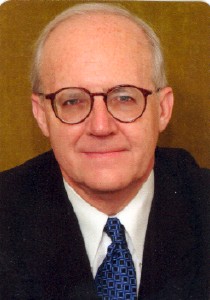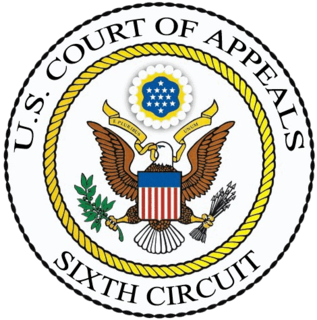
In the law of the United States, diversity jurisdiction is a form of subject-matter jurisdiction that gives U.S. federal courts the power to hear lawsuits that do not involve a federal question. Diversity jurisdiction requires two conditions to be met: first, there must be "diversity of citizenship" between a lawsuit's parties, meaning the plaintiffs must be citizens of different U.S. states than the defendants; and second, the lawsuit's "amount in controversy" must be more than $75,000. If a lawsuit does not meet these conditions, U.S. federal courts will normally lack the power to hear it unless it involves a federal question, and the lawsuit would need to be heard in state court instead.
Statutory interpretation is the process by which courts interpret and apply legislation. Some amount of interpretation is often necessary when a case involves a statute. Sometimes the words of a statute have a plain and a straightforward meaning. But in many cases, there is some ambiguity in the words of the statute that must be resolved by the judge. To find the meanings of statutes, judges use various tools and methods of statutory interpretation, including traditional canons of statutory interpretation, legislative history, and purpose. In common law jurisdictions, the judiciary may apply rules of statutory interpretation both to legislation enacted by the legislature and to delegated legislation such as administrative agency regulations.

Danny Julián Boggs is an American attorney and a Senior United States Circuit Judge of the United States Court of Appeals for the Sixth Circuit. He was appointed to the court in 1986 and served as its Chief Judge from September 2003 to August 2009. Boggs was on the short list of President George W. Bush's candidates for the U.S. Supreme Court.

In the United States, removal jurisdiction allows a defendant to move a civil action filed in a state court to the United States district court in the federal judicial district in which the state court is located. A federal statute governs removal.

American Booksellers Ass'n, Inc. v. Hudnut, 771 F.2d 323, aff'd mem., 475 U.S. 1001 (1986), was a 1985 court case that successfully challenged the constitutionality of the Antipornography Civil Rights Ordinance, as enacted in Indianapolis, Indiana the previous year.
Merrell Dow Pharmaceuticals Inc. v. Thompson, 478 U.S. 804 (1986), was a United States Supreme Court decision involving the original jurisdiction of the federal district courts under 28 U.S.C. § 1331.

In United States law, a federal enclave is a parcel of federal property within a state that is under the "Special Maritime and Territorial Jurisdiction of the United States". In 1960, the year of the latest comprehensive inquiry, 7% of federal property had enclave status. Of the land with federal enclave status, 57% was under "concurrent" state jurisdiction. The remaining 43%, on which some state laws do not apply, was scattered almost at random throughout the United States. In 1960, there were about 5,000 enclaves, with about one million people living on them. While a comprehensive inquiry has not been performed since 1960, these statistics are likely much lower today, since many federal enclaves were military bases that have been closed and transferred out of federal ownership.

Raymond Michael Kethledge is a United States Circuit Judge of the United States Court of Appeals for the Sixth Circuit. He was appointed by President George W. Bush in 2008. Kethledge appeared on Donald Trump's list of potential Supreme Court of the United States nominees in 2016, and was described by press reports as a finalist in President Trump's nomination to replace Anthony Kennedy on the court.

Williams v. Pryor, 229 F.3d 1331, rehearing denied, 240 F.3d 944 was a federal lawsuit that unsuccessfully challenged an Alabama law criminalizing the sale of sex toys in the state. In 1998, a statute enacted by the legislature of the State of Alabama amended the obscenity provisions of the Alabama Code to make the distribution of certain defined sexual devices a criminal offense. Vendors and users of such devices filed a constitutional challenge to the statute in the United States District Court for the Northern District of Alabama against William H. Pryor, Jr., in his official capacity as the Attorney General of the State of Alabama. The district court declined to hold the statute violated any constitutional right but determined the statute was unconstitutional because it lacked a rational basis. The State appealed to the Eleventh Circuit Court of Appeals, which reversed the lower court ruling on October 12, 2000.

Citizens for Tax Reform v. Deters, 518 F.3d 375, was a decision that overturned an Ohio statute that made it a felony to pay petitioners by the signature.
Tax protesters in the United States advance a number of constitutional arguments asserting that the imposition, assessment and collection of the federal income tax violates the United States Constitution. These kinds of arguments, though related to, are distinguished from statutory and administrative arguments, which presuppose the constitutionality of the income tax, as well as from general conspiracy arguments, which are based upon the proposition that the three branches of the federal government are involved together in a deliberate, on-going campaign of deception for the purpose of defrauding individuals or entities of their wealth or profits. Although constitutional challenges to U.S. tax laws are frequently directed towards the validity and effect of the Sixteenth Amendment, assertions that the income tax violates various other provisions of the Constitution have been made as well.
Tolling is a legal doctrine that allows for the pausing or delaying of the running of the period of time set forth by a statute of limitations, such that a lawsuit may potentially be filed even after the statute of limitations has run. Although grounds for tolling the statute of limitations vary by jurisdiction, common grounds include:

Rogers v. Wal-Mart Stores, Inc., 230 F.3d 868, was a case decided by the 6th Circuit that held that remand to a state court cannot be achieved after removal to a federal court by lowering the damages sought to fall below the amount in controversy requirement.

American Booksellers Foundation for Free Expression v. Strickland, 560 F.3d 443, is a decision of the Sixth Circuit Court of Appeals involving a constitutional challenge—both facially and as-applied to internet communications—to an Ohio statute prohibiting the dissemination or display to juveniles of certain sexually-explicit materials or performances. The Sixth Circuit panel declined to resolve the constitutional issue but, instead, certified two questions to the Ohio Supreme Court regarding the interpretation of the statute. The Ohio Supreme Court answered both questions affirmatively and placed a narrowing construction on the statute. Since the Ohio Supreme Court's decision, the Sixth Circuit has not reheard the case.

The United States was the first jurisdiction to acknowledge the common law doctrine of aboriginal title. Native American tribes and nations establish aboriginal title by actual, continuous, and exclusive use and occupancy for a "long time." Individuals may also establish aboriginal title, if their ancestors held title as individuals. Unlike other jurisdictions, the content of aboriginal title is not limited to historical or traditional land uses. Aboriginal title may not be alienated, except to the federal government or with the approval of Congress. Aboriginal title is distinct from the lands Native Americans own in fee simple and occupy under federal trust.
Things Remembered, Inc. v. Petrarca, 516 U.S. 124 (1995), was a case in which the United States Supreme Court held that when an action has been removed from state court to a United States Bankruptcy Court, and the bankruptcy court remands to state court because of a timely-raised defect in removal procedure or lack of subject-matter jurisdiction, the removal statute precludes a United States Court of Appeals from reviewing the order.
People v. Aguilar, 2 N.E.3d 321, was an Illinois Supreme Court case in which the Court held that the Aggravated Unlawful Use of a Weapon (AUUF) statute violated the right to keep and bear arms as guaranteed by the Second Amendment. The Court stated that this was because the statute amounted to a wholesale statutory ban on the exercise of a personal right that was specifically named in and guaranteed by the United States Constitution, as construed by the United States Supreme Court. A conviction for Unlawful Possession of a Firearm (UPF) was proper because the possession of handguns by minors was conduct that fell outside the scope of the Second Amendment's protection.

Connection Distributing Co. v. Holder, 557 F.3d 321 is a case in which the United States Court of Appeals for the Sixth Circuit held that the record-keeping provisions of the Child Protection and Obscenity Enforcement Act did not violate the First Amendment.
Patchak v. Zinke, 583 U.S. ___ (2018), is a United States Supreme Court case in which the Court upheld the Gun Lake Trust Land Reaffirmation Act, which precludes federal courts from hearing lawsuits involving a particular parcel of land. Although six Justices agreed that the Gun Lake Act was constitutional, they could not agree on why. In an opinion issued by Justice Thomas, a plurality of the Court read the statute to strip federal courts of jurisdiction over cases involving the property and held that this did not violate Article III of the U.S. Constitution. In contrast, Justices Ginsburg and Sotomayor, both of whom concurred in the judgment, upheld the Act as a restoration of the government's sovereign immunity. Chief Justice Roberts, writing for himself and Justices Kennedy and Gorsuch, dissented on the ground that the statute intruded on the judicial power, in violation of Article III.
Mont v. United States, No. 17-8995, 587 U.S. ___ (2019), is a United States Supreme Court case concerning the proper interpretation of "supervised release" under 18 U.S.C. §3624(e). The case involved a prisoner who was convicted on drug distribution charges and was sentenced to imprisonment and supervised release. While on supervised release, he was charged and pleaded guilty to various state-law offenses, but due to administrative delays, his sentence was not entered until after the day on which his supervised release was to end. He was nonetheless charged with violating the terms of his supervised release, and he sought to challenge the court's jurisdiction to hear the case, arguing that his pretrial detention for the later offenses. The question in the case was whether a term of supervised release for one event can be tolled (paused) by imprisonment for another offense.







